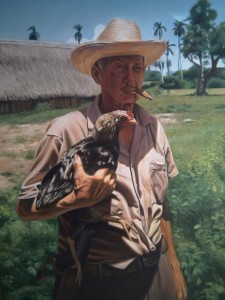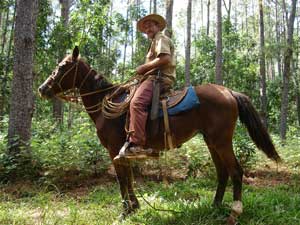
LA PALABRA “GUAJIRO”, SU SIGNIFICADO, ORIGEN IMAGINATIVO Y ACTUALMENTE REAL. PHOTOS.
En Cuba se utiliza para denominar a aquellas personas que trabajan o viven en el campo, o para denominar a las personas que se comportan como ellos.
Hay muchas fuentes que quieren dar explicacion del origen de la voz “Guajiro”.
Se dice que tal palabra surgió cuando, durante la guerra hispano-cubano-americana (1898) los soldados estadounidenses decían a los combatientes del cubano Ejército Libertador: You are a hero, y que de esas dos últimas palabras (“héroe de guerra”) se derivó “guajiro”.
Lo cierto es que ese vocablo aparece registrado en el Diccionario provincial casi razonado de voces y frases cubanas, de Estaban Pichardo, que tuvo su cuarta edición, la última en vida de su autor, en 1875, más de veinte años antes de aquel conflicto bélico.
DISTINTAS FUENTES DE SU PROCEDENCIA
Desconozco de dónde pudo salir la aseveración de que proviene de una corrupción del inglés. Hay gente que atribuye a ese idioma un influjo mayor del que realmente tuvo en Cuba. Algo similar sucede con el término congrí, que es la mezcla del arroz blanco con los frijoles colorados guisados juntos. El lexicógrafo cubano Rodríguez Herrera lo hacía derivar de la voz inglesa concrete, la mezcla o mortero de arena, piedra y cemento. Eso, en opinión de otros especialistas, es un disparate.
ORIGEN DE LA PALABRA GUAJIRO
Se ha dicho que guajiro es una palabra que proviene del yucateco, idioma donde significa “señor”. Pero asegura Pichardo que en la época en que escribió su libro apenas se usaba en Yucatán, mientras que en Cuba era muy común y muy distinto su significado pues aquí guajiro es sinónimo de campesino. Con esa acepción lo recoge el diccionario de la Academia de la Lengua.
Fernando Ortiz, en su Nuevo catauro de cubanismos (1974) incluye también la palabra y José Juan Arrom le concede la extensión que merece en su Estudios de lexicografía antillana (1980). Expresa Arrom que la voz se empleó en Santo Domingo, “si bien allí hoy parece haber caído en desuso”, y, en sentido restringido, en Guatemala, país donde, afirma Martín Alonso, se llama así a los centroamericanos en general, y también a los guatemaltecos no nacidos en la capital del país.

Arrom cita a Oviedo, que en su General y natural historia de Indias (1535) asevera que guajiro no es término originario de la Tierra Firme sino de procedencia caribe, es decir, antillana. Acude asimismo a la Apologética historia de las Indias, del padre Las Casas, y recuerda que entre los taínos existían tres palabras para significar el grado y la dignidad de los señores: matunheri, que equivalía a alteza; baharí, señoría, y guaxerí, vuestra merced. Y añade que en su Historia de las Indias, Las Casas expresa que guaxerí significa señor. Rafael Calderón, en su gramática de la lengua goajira, dice que guashire es caballero y que guashiri significa rico. De todo ello concluye Arrom la procedencia arahuaca de la palabra.
Arrom dice que en los vocablos guaxerí, baharí y matunherí los fonemas xerí, harí y herí son vacilantes grafías de un mismo morfema que corresponde a la voz arahuaca “a-hatí”, es decir, camarada, compañero, compatriota. Entonces si matun significa generoso, noble, matunherí sería noble, generoso compañero o compatriota. Y que si bahü es casa, baharí quiere decir compañero de casa.
Bachiller y Morales asegura que es artículo. Arrom no concuerda con ese erudito. Para él gua o wa es prefijo pronominal que significa nos, nuestro.
Puntualiza: “Guajiro, por tanto, vendría a ser lo mismo que nuestro compañero o compatriota, equivalente a la palabra inglesa milord y a la española monseñor, con lo que queda demostrado que es un término de tratamiento a la vez familiar y respetuoso, de procedencia taína”.
Ortiz recuerda en su Catauro que hubo una nación de goajiros, La Guajira, pueblo ganadero que se ubicó entre Venezuela y Colombia. Pero la palabra guajiro, la adoptaron allí de los caribes. Afirma el ilustre polígrafo: “Nuestro nombre de guajiros puede haberse tomado de los indios esclavizados que en el siglo XVI se trajeron desde Venezuela”.
Guajiro entonces no surgió en los días de la guerra hispano-cubano-americana. Ni es voz derivada del inglés. Su origen es más antiguo y más todavía … es nuestro.

THE WORD “GUAJIRO”, ITS MEANING, IMAGINATIVE ORIGIN AND CURRENTLY REAL. PHOTOS.
In Cuba it is used to refer to those people who work or live in the countryside, or to refer to people who behave like them.
There are many sources that want to explain the origin of the word “Guajiro”.
It is said that such a word arose when, during the Spanish-Cuban-American war (1898) the American soldiers said to the combatants of the Cuban Liberation Army: You are a hero, and that from those last two words (“war hero”) “guajiro” was derived.
The truth is that this word appears registered in the Provincial Dictionary almost reasoned of Cuban words and phrases, by Estaban Pichardo, which had its fourth edition, the last in the life of its author, in 1875, more than twenty years before that war.
DIFFERENT SOURCES OF ITS ORIGIN
I do not know where the assertion that it comes from a corruption of English could have come from. There are people who attribute to that language a greater influence than it really had in Cuba. Something similar happens with the term congrí, which is the mixture of white rice with red beans cooked together. The Cuban lexicographer Rodríguez Herrera derived it from the English word concrete, the mixture or mortar of sand, stone and cement. That, in the opinion of other specialists, is nonsense.
ORIGIN OF THE WORD GUAJIRO
It has been said that guajiro is a word that comes from Yucatecan, a language where it means “sir”. But Pichardo assures that at the time he wrote his book it was barely used in Yucatan, while in Cuba it was very common and its meaning was very different because here guajiro is synonymous with peasant. With that meaning it is included in the dictionary of the Academy of the Language.
Fernando Ortiz, in his Nuevo catauro de cubanismos (1974) also includes the word and José Juan Arrom gives it the extension it deserves in his Estudios de lexicografía antillana (1980). Arrom states that the word was used in Santo Domingo, “although there today it seems to have fallen into disuse,” and, in a restricted sense, in Guatemala, a country where, according to Martín Alonso, Central Americans in general are called by this name, as well as Guatemalans not born in the capital of the country.
Arrom cites Oviedo, who in his General y natural historia de Indias (1535) asserts that guajiro is not a term originating from Tierra Firme but of Caribbean, that is, Antillean, origin. He also refers to the Apologetic History of the Indies, by Father Las Casas, and recalls that among the Tainos there were three words to signify the rank and dignity of lords: matunheri, which was equivalent to highness; baharí, lordship, and guaxerí, your grace. And he adds that in his History of the Indies, Las Casas says that guaxerí means lord. Rafael Calderón, in his grammar of the Goajira language, says that guashire is a gentleman and that guashiri means rich. From all this, Arrom concludes the Arawak origin of the word.
Arrom says that in the words guaxerí, baharí and matunherí the phonemes xerí, harí and herí are vacillating spellings of the same morpheme that corresponds to the Arawak word “a-hatí”, that is, comrade, companion, compatriot. So if matun means generous, noble, matunherí would be noble, generous companion or compatriot. And if bahü is house, baharí means housemate.
(READ MORE IN THE SPANISH SECTION ABOVE)

Agencies/ Wiki/ Lecturas/ CiroBianchiRoss/ lavozGuajiro/ Extractos/ Excerpts/ Internet Photos/ Arnoldo Varona.
TheCubanHistory.com
THE CUBAN HISTORY, HOLLYWOOD.



